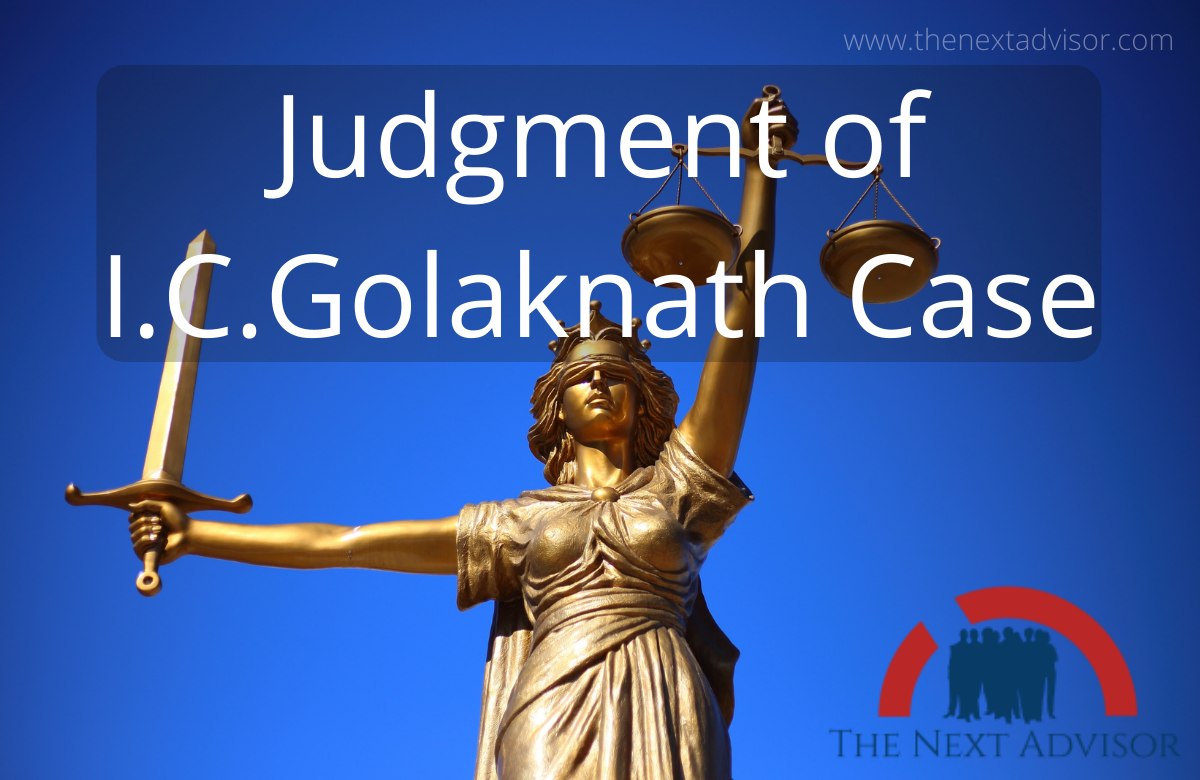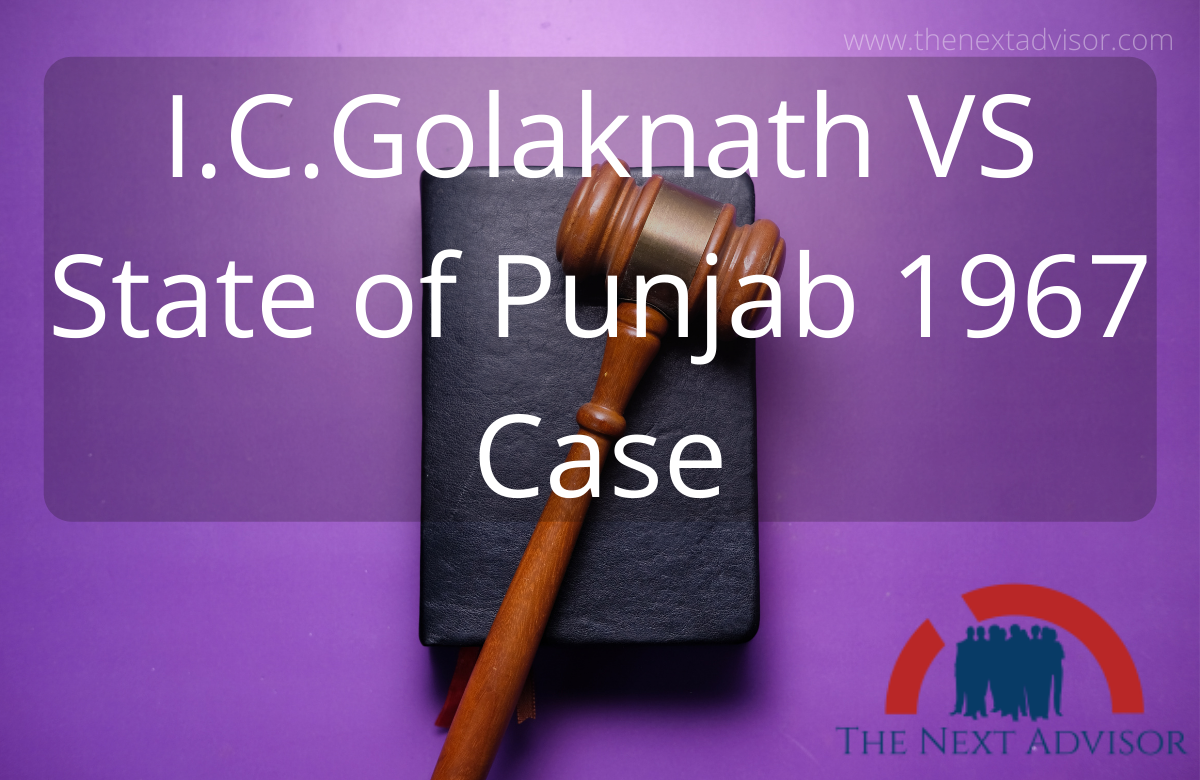Today I would like to put your attention on the I.C.Golaknath Case. Let us see with some important points that What happened in I.C.Golaknath VS The State of Punjab(1967). And what happened in I.C.Golaknath Vs The State of Punjab’s Case due to which Court had to pass the judgment in which Court said that Fundamental Rights is not amendable in nature. To understand the I.C.Golaknath’s case we have to study the 1950 and 1951’s scenarios. If you remember in 1951, one case was very famous named Shri Shakri prasad Vs Union Of India(1951).In the Judgment of Shri Shankri Prasad Vs Union of India Court said that the Fundamental Rights is amendable in nature. In 1950 State governments want to reform land revenue but Article 19(1)(f) of our Constitution was rendered to the government. Let us see it with some important points.
The Amendability of Fundamental Rights(Shakri prasad Vs Union Of India)
• Zamindari system was a rampant problem State government failed to eliminate it
• 1st Amend Act was passed(to understand the 1st amendment please refer- First Constitutional Amendment Act 1951)
• Right to Property was made limited
•The Zamindars challenged the First Amendment in the Supreme Court, stating that it was unconstitutional and invalid.
•Parliament has the power to amend the Fundamental Rights. And parliament has the power to amend it in their own way and no one can cross it or challenge it.
Seventeenth Amendment Act, 1964
- Prohibition of the acquisition of land under personal cultivation unless the market value of the land is paid as compensation.
- Included 44 more Acts in the Ninth Schedule. From these 44 Acts, one was Panjab Government Act i.e. Punjab Security land tenure Act. And the Surplus land of Zamindars of Panjab will acquired by Punjab government
I.C.Golaknath Vs State of Punjab 1967
• Surplus Land of I.C.Golaknath family was taken away by the state under the Punjab security and Land Tenures Act. I.C.Golaknath’s family had 500 acres of farm land. And when Punjab Government has acquired this land the Punjab government thought that 30 acres can be given to I.C.Golajnath’s family and the remaining land will be acquired by the Punjab government for social and economical progress. Then I.C.Golaknath’s family filed the petition against this land acquiring process through Palkiwala.
• The petitioner(Palkiwala) argued that the constitution of India was drafted by the constituent assembly and it is of permanent nature.
• No one can change or can try to bring change in the constitution of India. And if parliament wants to amend the Constitution then parliament has to follow the Doctrine of implied limitation.
•Doctrine of implied limitation says that parliament can amend the constitution but it will have some restrictions. i.e. basic structrure.They argued that the word ” amendment ” in question only implies a change in accordance with the basic structure but not altogether a new idea.
• Further, the petitioner contended that the fundamental rights enshrined under part III of the constitution cannot be taken away by the parliament. ( U / A 19 ( 1 ) ( f ))
• Fundamental Rights are the essential and integral part and soul of the constitution without which the constitution is like a body without a soul.
• The petitioner also argued that Article 368 of our constitution only defines the procedure for amending the constitution.
• It does not give the power to the parliament to amend the constitution. eleven Judge Bench was constituted to declare the I.C.Golaknath case.
•They sought to have the seventeenth amendment – which had placed the Punjab Act in the ninth schedule – declared ultra vires ( beyond the powers )
Questions before Court
“Whether the parliament has the absolute power and the power to amend the fundamental rights enshrined under the constitution or not?.”And if yes then how much power parliament has to amend the constitution?

Judgment of I.C.Golaknath Case
Judgment os I.C.Golaknath Vs State of Punjab 1967
• The Supreme Court held that Parliament could not amend Fundamental Rights, and this power would be only with a Constituent Assembly.
• The Court held that an amendment under Article 368 is ” law ” within the meaning of Article 13 of the Constitution and therefore if an amendment ” takes away or abridges ” a Fundamental Right by Part III, it is void.
•Therefore, to save the democracy from an autocratic action of the parliament the majority held that parliament cannot amend the fundamental rights enshrined under Part Ill of the Constitution of India.
• The majority said that fundamental rights are the same as natural rights. These rights are important for the growth and development of a human being.
The effect of the judgment of I.C.Golaknath and 24th Constitutional Amendment Act
•In I.C.GolakNath, Subba Rao CJ ( Chief Justice ) said that Art. 368 only provided ” procedure to amend the constitution ” only and not the ” power ” to amend. ( Prior to 1971, Art. 368 had a marginal note ” procedure to amend ” only.
•Due to the difficulties created in Golak Nath, the Parliament passed the 24th amendment Act in 1971 and made significant changes to Art. 368 and Art. 13 and nullified the Golak Nath effect!
In response to the judgment of I.C.Golaknath, Parliament did the 24th amendment to clash over this judgment
• Due to the judgment of the Golaknath case parliament doesn’t have the power to amend the constitution. Therefore 24th Amendment Act, 1971 is amended Articles 13 and 368.
• It declared that the Parliament has the power to abridge or take away any of the Fundamental Rights under Article 368 and such an Act, will not be law under the meaning of Article 13.
• Also, Made it compulsory for the President to give his assent to a Constitutional Amendment Bill.
• The 25th Amendment Act, 1972, Restricted property rights and compensation in case the state takes over private property

























